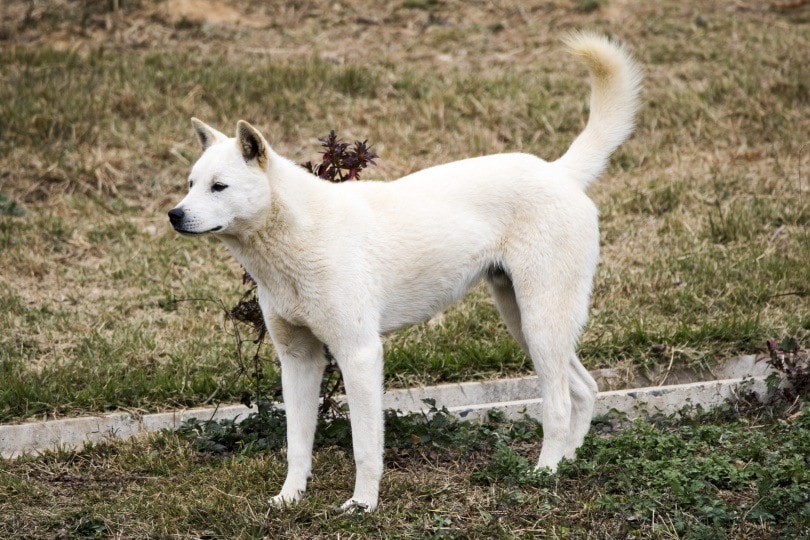
The Jindo is a wolf-like dog breed from South Korea with upright ears, a curled tail, and an athletic body. Due to their aptitude for problem-solving, tremendous loyalty, and intense hunting drive, Jindos have established themselves as excellent guardians and hunters in their native area. In the US, these dogs still perform some of these tasks to a certain extent, but they are now kept primarily as family pets.
If you are interested in this breed and are considering getting a Jindo, or even if you already have one, understanding their lifespan is important. The average lifespan is from 12-13 years. Let’s explore Jindo’s longevity, why some dogs live longer than others, ways to tell a dog’s age, and more.
What’s the Average Lifespan of a Jindo?
With only a few known health problems, the Jindo is typically a robust and long-lived breed. The average lifespan of these dogs is usually 12-13 years, with many living up to 14 years or longer. Discoid lupus erythematosus and hypothyroidism are two health concerns that you need to be mindful of among the breed’s few recognized health issues.
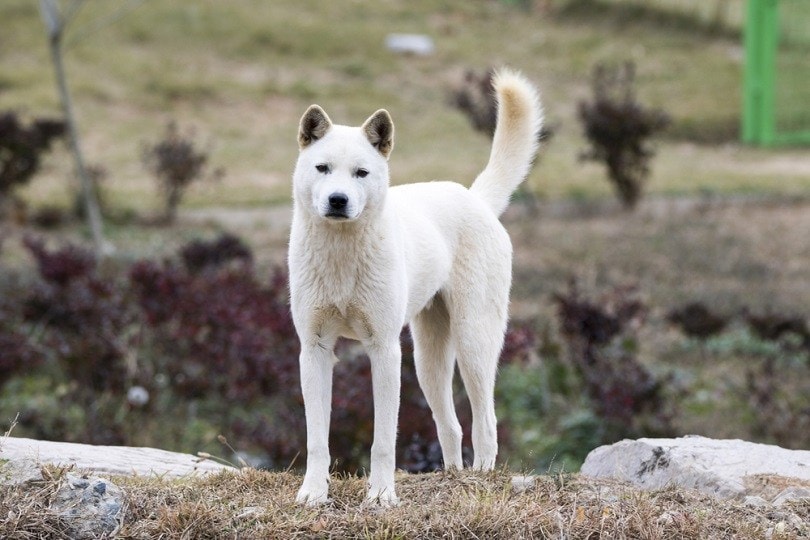
Why Do Some Jindos Live Longer Than Others?
The quality of the food Jindos eat, how much they exercise, what they do for mental stimulation, dental care, vet routines, and several other factors affect how long they live. Let’s discuss these elements in more detail.
1. Nutrition
A Jindo with a healthy weight tends to live longer. Obese dogs have a higher risk of developing debilitating joint issues and heart disease. The nutrient content of their diet also matters a lot.
We frequently hear that our bodies are temples, and what we put into them will determine what we get. Well, the same goes for our canines. To maintain your pet’s optimal health and longevity, you must feed them a well-balanced complete diet suitable for their life stage. This ensures they get all the nutrients a healthy dog needs.
2. Exercise
One of the keys to prolonging your dog’s life is exercise, which also has the added benefit of extending your own life!
Whether we’re talking about humans or dogs, there’s no denying that exercise boosts endorphins, reduces stress, and balances emotions and moods. Regular physical activity can help keep Jindos happy and healthy, in addition to assisting them in maintaining an ideal weight and preserving the health of their cardiovascular system.
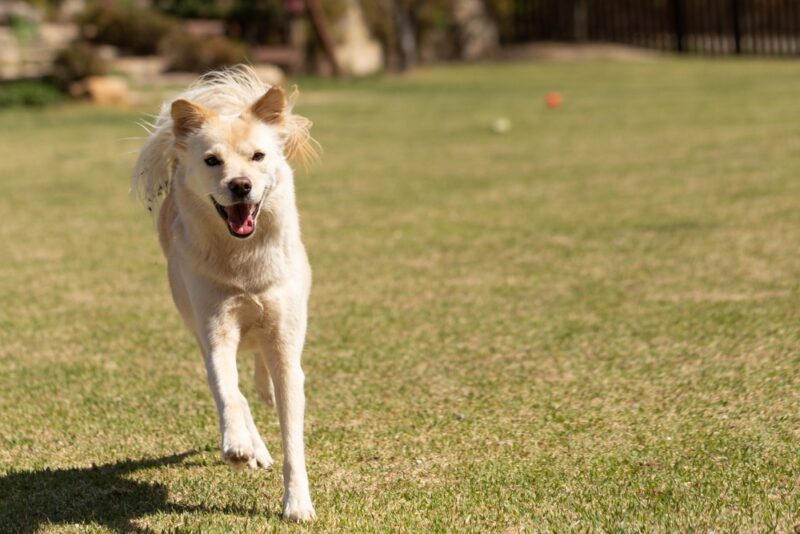
3. Mental Stimulation
Dogs need mental stimulation to be happy—just like people do. A bored Jindo may experience anxiety, depression, and even illness. Therefore, keeping your dog engaged and mentally active can help them live longer. Keep their minds sharp as they age with training, socializing, one-on-one attention, games, and other enrichment activities.
You can utilize a variety of activities and toys to improve a Jindo’s environment and keep them mentally stimulated. The brain of even an elderly dog will benefit from brief daily training sessions.
4. Dental Hygiene
The importance of dental care for Jindos is sometimes underestimated. Many of us forget to brush our pets’ teeth regularly. But poor dental care can cause gingivitis, plaque, and even periodontal disease.
Dr. Jan Bellows, a Diplomat of the American College of Veterinary Dentists, claims that routine dental care can extend a dog’s quality of life without dental pain or disease by 3 to 5 years.
The good news is that maintaining a Jindo’s oral health is not difficult. You only need to brush their teeth regularly with a dog toothpaste, feed them safe dental treats and chew toys, and have your vet examine their teeth every time they come in for a checkup.
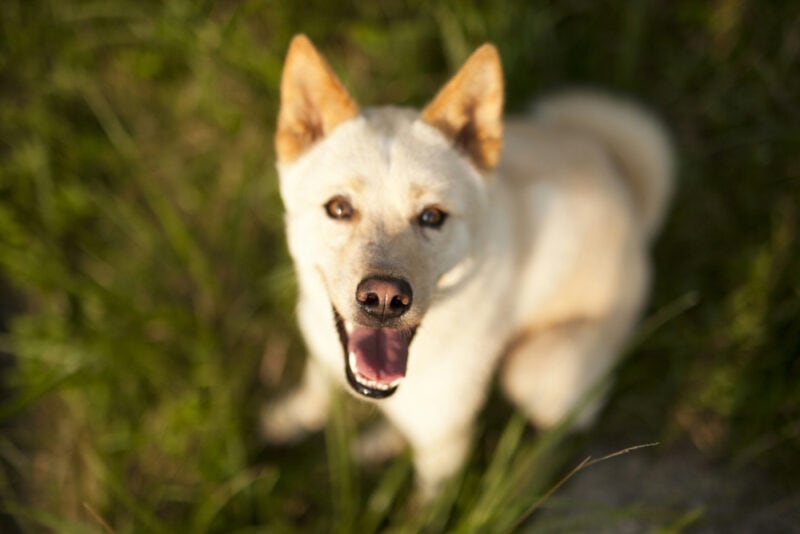
5. Vet Visits
The goal of vet check-ups is to maintain your dog’s optimal health and give you a clear picture of their needs. Additionally, they provide your vet with the opportunity to identify potential issues before they become serious situations. Therefore, yearly visits to the vet are necessary. When your Jindo reaches senior status, you should increase the frequency to every 6 months or so.
We all know that a problem detected at early stages is more likely to be successfully treated and resolved. Your Jindo will have the best chance of living a long, healthy life if you follow a regular preventative care schedule.
The 3 Life Stages of a Jindo
Puppy: 0–12 Months

For Jindos, the first 12 months of rapid growth are known as the puppy stage. Scheduling your puppy’s vaccinations and parasite control is something you need to do early on. Your vet will advise you on the right plan to deal with your animal’s individual situation.
Adult: 1–8 years
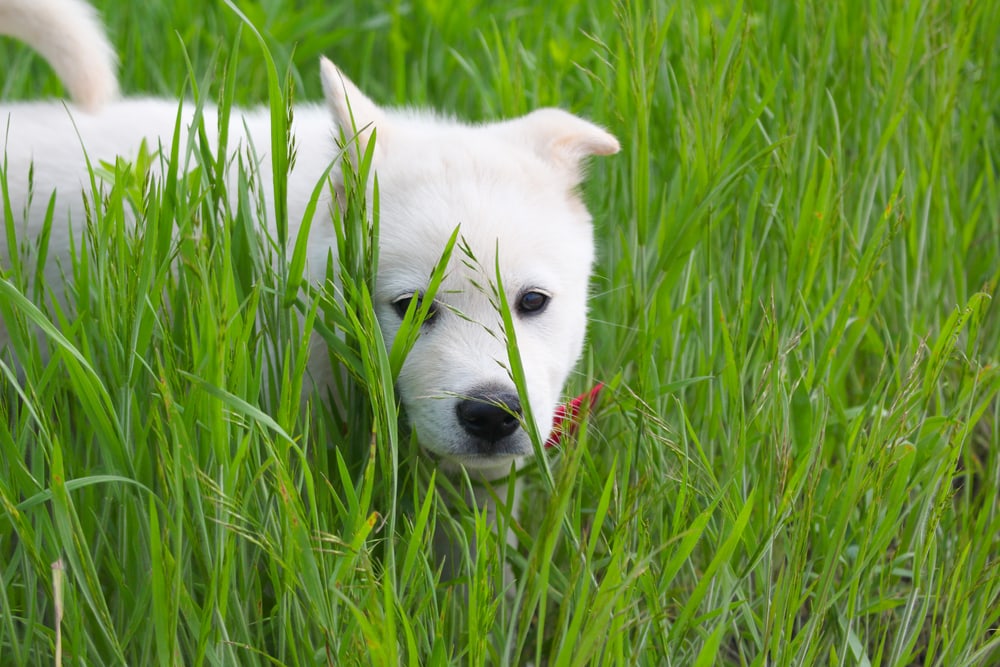
The adult stage of the Jindo’s life cycle begins at around 12 months and can last up to the age of 8. It’s a fantastic time to look for things you and your dog can do together, such as hill walking or agility training.
Senior: 8–16 years

You will need to monitor your Jindo’s health even more closely as they reach this stage of life. For elderly dogs, routine laboratory tests are especially crucial since they enable early disease detection. Many health conditions will have a better chance of being controlled if picked up early, leading to increased quality of life and longevity.
How to Tell Your Jindo’s Age
If you have a Jindo puppy, it’s pretty easy to estimate your dog’s age by looking at their teeth. The first year is when teeth start to develop, so if your dog has any missing teeth or any “baby” teeth, they are likely still in the puppy stage. An older dog may have some gray hairs on the snout and are likely to be less lively and active than a young Jindo!
Conclusion
In the blink of an eye, our dogs go from energetic puppies to calm seniors. We want them to live with us forever, but they can’t. Even though the lifespans of Jindos are considerably shorter than ours, we can make little adjustments to their way of life and level of care to help them live as long and as happily as possible.
Featured Image Credit: jamongcreator, Shutterstock
The post How Long Does a Jindo Dog Live? Lifespan & Care Tips appeared first on Pet Keen.




